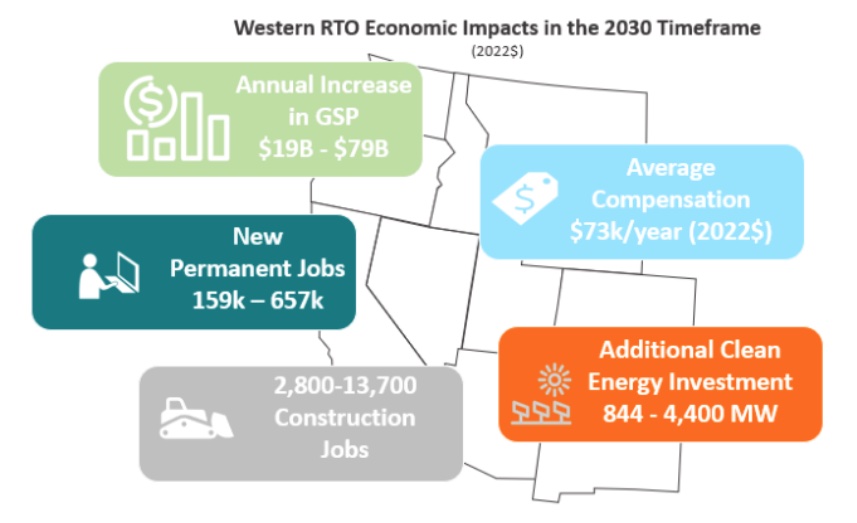New Research Concludes a Western-Wide RTO Would Unleash Economic Development Across the West

Another new expert study confirms the substantial benefits of organized wholesale electricity markets1, this time demonstrating that market expansion means big business and new jobs for Western states. On July 26, Energy Strategies and Peterson & Associates released a comprehensive study of the economic impact of developing a West-wide organized electricity market known as a Regional Transmission Organization (RTO). An RTO would more fully coordinate future generation and transmission planning , unlike current options developing in the West that only trade power in real-time or day-ahead time frames.
This study reaffirms that a West-wide RTO would create $2.2 billion in annual energy cost savings by 2030 and provides more detail on the benefits to state economies. An RTO would create a more efficient energy system by prioritizing low-cost resources and improving resource sharing across utility territories. Lower energy costs help Western states retain and attract business, driving local economic development. Similar to a recent announcement of a battery manufacturing plant in Kansas that was named the largest economic development project in the state’s history, clean energy development equals job creation. The economic activity from a Western RTO would increase annual gross state revenue across the West up to $79 billion per year, all while creating 657,000 new, permanent, high-paying jobs, according to the study. Businesses with clean energy goals would be more enticed to expand into the West if an RTO is established, not only for lower energy costs overall but also for the ability to enter into clean energy deals directly. A Western RTO is projected to catalyze up to 4,400 MWs of new corporate clean energy purchases by 2030.
Summary of Economic Impacts Associated with RTO Formation

Source: Western RTO Economic Impact Study, July 26, 2022
The study explains that an RTO would not only drive down costs for Western states and increase sustainable economic development but would increase reliability at the same time.
Western grid reliability is also projected to increase as an RTO would expand and diversify the footprint over which electricity is managed. More diverse resources balanced and shared over a wider geographic region enhances the ability to move electricity from where excess supply exists to where it’s needed. As extreme weather increases, maximizing the balancing footprint improves reliability. The 38 separate balancing authorities in the West currently hamper this. An RTO would consolidate transmission operation and, in turn, optimize and expand transmission to move the electricity to where it is needed.
Finally, a Western RTO would also provide additional information and visibility into power systems that is important to both grid operators and large energy customers. RTOs offer new tools for managing shortages and coordination that is critical during severe weather and grid emergencies. As stress on the grid increases across the U.S., especially in the West, state decision makers and businesses can’t afford to delay low-cost solutions that increase reliability. Research from the Clean Energy Buyers Institute(CEBI) shows that organized wholesale markets not only provide greater customer choice but also market transparency that help customers achieve clean energy and carbon reduction goals.
CEBA members spanning diverse industries have supported RTO development across the West as a tool for achieving all these benefits and more. In light of these new findings, Western governors and state legislatures should provide leadership on market expansion to drive economic development and grow their state economies. To learn more about CEBA’s work on organized wholesale market expansion in the West, contact innovation@cebuyers.org.
1Organized wholesale markets are centrally managed markets that provide a platform for transparent and competitive wholesale electricity trading. Like a conductor within an orchestra of utilities, they independently operate transmission and direct the wholesale market generators across the region.
